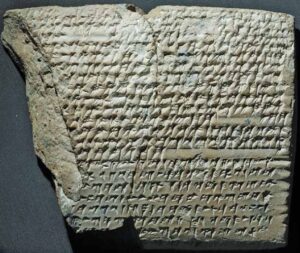
Photo: Courtesy of University of Chicago
After a legal battle spanning over a decade, the fate of the Persepolis Collection at the University of Chicago has been determined. In a unanimous decision, the United States Supreme Court affirmed a decision by the federal appeals court in Chicago, ruling in favor of Iran. In an opinion written by Justice Sotomayor, the court writes that the plaintiffs cannot collect on a judgment against Iran by transferring ownership of antiquities.
This judgment stems from a case in which victims of a terror attack in Israel sued Iran and received a $71.5 million judgment against the Middle Eastern nation. Iran did not pay the judgment, and so the plaintiffs attempted to seize assets located in the US under the Foreign Sovereign Immunities Act (FSIA). The items they attempted to seize include the Persepolis Collection, a collection of 30,000 thousand clay tablets, many with Elamite inscriptions, loaned from Iran to the University of Chicago’s Oriental Institute in 1937. The rare and historically priceless artifacts were excavated by the university’s archeologists in the 1930s in the ancient city of Persepolis. The finds were then given as a long-term loan to the Oriental Institute for cataloging, researching, and translating.
The victims argued that the objects could be seized under the FSIA (the same law used to restitute Klimt’s Portrait of Adele Bloch-Bauer, known as “The Woman in Gold,” to Maria Altmann). The FSIA grants immunity to foreign states, except for nations (like Iran) designated as state sponsors of terrorism. In addition, the FSIA also exempts certain foreign-owned property in commercial use in the US. In this case, the lower court found that the FSIA exemptions cover property used by the foreign state, but do not include property used by a third party, like the university.
In finding that an exception to the FSIA does not apply, the victims will be unable to seize these objects. A representative from the University of Chicago, Marielle Sainvilus, stated, “The Oriental Institute of the University of Chicago is committed to preserving and protecting a collection of Persian artifacts on loan from the Iranian government, which are among the region’s most important historical documents…These ancient artifacts, along with the Oriental Institute’s own Persian collection, have unique historical and cultural value. Today’s ruling reaffirms the University’s continuing efforts to preserve and protect this cultural heritage.”
In 2006, the then-director of the Oriental Institute Gil Stein described his disbelief, “It’s a bizarre, almost surreal kind of thing… You’d have to imagine how we would feel if we loaned the Liberty Bell to Russia and a Russian court put it up for auction,” Stein said.
The significance of objects from Persepolis cannot be understated. Persepolis is considered by UNESCO to have “outstanding universal value.” UNESCO describes Persepolis as “magnificent ruins…among the world’s greatest archaeological sites… among the archaeological sites which have no equivalent and which bear unique witness to a most ancient civilization.”